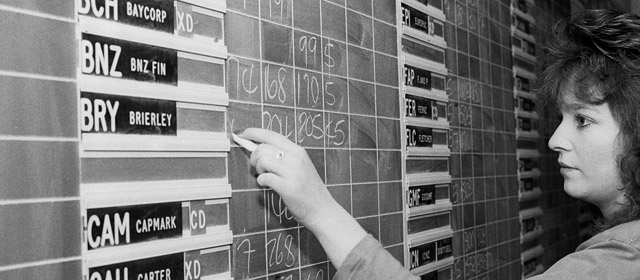He korero whakarapopoto
A stock exchange is an organisation where stock (shares in companies and fixed-interest bonds) are bought and sold. Companies or government projects sell stocks to raise money. Investors buy stocks to increase their wealth or influence a company’s direction.
The price of a share is set by what buyers are willing to pay for them. A person who owns a share owns a small amount of the company, and so makes money if the company makes a profit or the shares increase in value. However, an investor can lose money if their shares have dropped in value when they sell them.
First shares and stock exchanges
The first companies to sell shares in New Zealand were banks. They sold shares to raise money to expand their operations. Share trading really took off during the gold rushes of the late 1860s, when gold-mining companies began selling shares.
Stockbrokers buy and sell stocks on behalf of investors, and make money by getting a payment for the stocks they buy or sell. The first full-time stockbrokers were Dunedin land agents Connell and Moodie, in 1866. They helped set up the first stock exchange in 1867. Only stockbrokers who are members of an exchange can trade stocks there.
Other stock exchanges were set up in Thames, Auckland, Reefton, Wellington, Taranaki, Invercargill, Gisborne and Christchurch.
Early 20th century
Mining shares dropped in value around 1900. Concerned that stockbrokers weren’t behaving honestly, stock exchanges set new rules for stockbrokers to follow, including a ban on:
- visitors in the stock exchange rooms
- advertising
- talking to journalists.
In 1915 some of the stock exchanges started the Stock Exchange Association of New Zealand, which set rules for the exchanges. The association started a monthly magazine.
Growth and crash
In the 1950s and 1960s large numbers of people invested in the stock market, sometimes as part of a ‘share club’, where groups of people bought shares together.
A national stock exchange was set up in 1983, based in Wellington. In 1987 more than 40% of adults in New Zealand owned shares, and the stock market was very busy.
In October 1987 the value of shares fell sharply, and many people lost large amounts of money. Most stockbroking companies shrank or collapsed.
After the crash, the stock exchange set new rules for stockbrokers to make them more responsible.
Computerised stock exchange
From June 1991 stock-exchange trading floors closed and all stock trading was done via computer systems. In the early 2000s the New Zealand Stock Exchange changed its name to NZX, became a publicly listed company and sold shares in itself.





